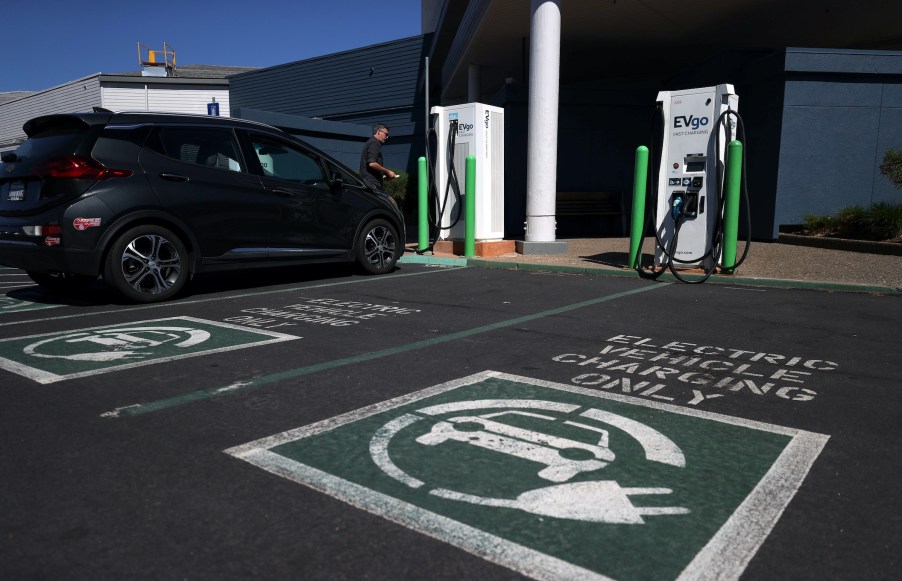
The Biggest Complaints About Electric Cars
There’s really no beating around the bush. Electric cars are growing in popularity. But with that popularity comes a number of complaints. But when it comes to electric cars, what do people have to complain about? Let’s dive in.

Newer electric cars aren’t always the most reliable
According to Consumer Reports, newer electric cars aren’t always the most reliable. While Consumer Reports gave EVs like the 2021 Chevrolet Bolt and the 2021 Toyota Prius Prime some pretty high predicated reliability ratings, not all electric cars fared so well. The reason? Well, Consumer Reports says that for man electric cars it has a lot to do with the technology used.
“Often, it’s not the EV tech that’s problematic,” explained Anita Lam, Consumer Reports’ associate director of automotive data integration. “It’s all the other new technology that could show up on any car—new infotainment systems, more sophisticated power equipment and gadgets—that often gets put on new EVs to feed a perception that they’re supposed to be luxurious and high-tech.”
Additionally, in its most recent reliability surveys, Consumer Reports members reported on their experiences with 329,000 vehicles. According to Consumer Reports, electric cars like the Audi E-Tron, the Kia Niro EV, and the Tesla Model Y all experienced their fair share of problems. Because of these problems, which included issues with build quality and electrical systems, both the E-Tron and the Niro EV lost their recommended status. The Model Y was also given a one out of five predicted reliability rating because of the number of reported reliability issues.

Electric cars depreciate faster than their gas-powered counterparts
Electric cars don’t just have the potential to be unreliable. Most also depreciate faster than gasoline-powered vehicles. Really, just take a look at the numbers. According to a recent iSee Cars study which determined the values of cars coming off a three-year lease term, you can expect a new sedan to depreciate 39% after three years and a truck to depreciate 34%. As for electric cars? iSee Cars reports that they depreciate 52%, giving them a depreciate rate nearly 1.4 times greater than the average for all vehicles.
“Categorically, electric vehicles depreciate more than the average vehicle because resale values take into account the $7,500 federal tax credit and other state and local credits that were applied to these vehicles when they were bought new,” iSeeCars CEO Phong Ly explained.
“Because the technology of EVs changes at a rapid pace, obsolescence also plays a role in their dramatic depreciation as well as consumer range anxiety and lack of public charging infrastructure.” The only electric car brand that doesn’t fit this trend? Tesla.
Charging an electric car can be a challenge
This one is pretty easy to understand. After all, it’s much easier to gas up a car and get back on the road than it is to charge an electric car. While gassing up a car takes only a few minutes, charging an electric car can take hours. Not to mention, not all car owners have access to the infrastructure needed to charge an electric car.
In an interview with The New York Times, Chris Nelder, manager of the E.V. grid integration group at the Rocky Mountain Institute, explained, “The fact is, about 40 percent of Americans don’t live in single-family homes where you could have a personal charger.” Nelder added, “There’s no doubt the cars are coming, so we should stop waffling and start building some charging infrastructure.”
He continued, “Unless there’s a charger at work or your apartment, or damn close to it, it’s not practical to buy an E.V.”
Those federal tax credits can be pretty confusing
It’s no secret that electric cars are eligible for federal tax credits. Unfortunately, not every car actually qualifies for the maximum tax credit available. According to the Clean Charge Network, once 200,000 cars from a particular manufacturer have been sold, the federal tax credit begins to phase out. Those federal tax credits aren’t instant either. Instead, you’re going to have to wait until you turn in your in your tax forms the following year.

Should you avoid buying one?
There are certainly some complaints surrounding electric cars. But don’t let them keep you from exploring what these kinds of vehicles have to offer either. After all, all signs point to electric cars being around for the foreseeable future.



